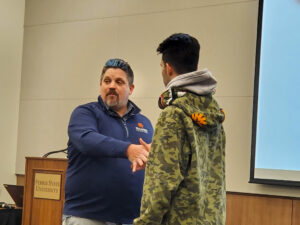Shafer Leadership Academy’s executive director Mitch Isaacs presented in front of a packed room at the Student Leadership Conference in the David L. Eisler Center last Friday on Nov. 18.
For this event, Isaacs broke the mold of traditional speeches. He rejected the microphone and walked between the aisles of the seated audience, getting into people’s personal space and engaging with individuals in the audience. His presentation was focused on skills that everyone must learn in any field, the nuances of body language and how to bring that knowledge to a professional environment.
The event organizers at Omicron Delta Kappa were hoping that the student body would learn core skills about how to thrive in a professional life.
Psychology senior and committee member of ODK Sydney Migorni said, “I hope [students] pick up useful skills because this is going to be very applicable to the business world. I’m just hoping they pick up on those core skills and how to interact with people in those sorts of scenarios.”
Isaacs’ speech was the first hour and a half, but the event also included a dinner, a presentation on proper dining etiquette and social time to network and practice the skills discussed in the presentations.
Many of the students were excited about what they learned from Isaacs’ presentation. Some felt that pointing out and discussing the body language that people see every day helped them relate to the topic because pointing and discussing common gestures and what they indicate helps as they navigate the social encounters of their life.

Digital animation and game design major Diego Horn was glad he attended the Student Leadership Conference.
“Honestly, I was thinking about skipping today, but I’m glad I didn’t,” Horn said. “I learned proper etiquette, [and] I’m getting a taste of what I’ll eventually have to deal with in the real world once I graduate.”
Isaacs made a name for himself presenting at colleges with a focus on leadership development. As the director of the non-profit Schaefer Leadership Academy in Indiana, Isaacs oversees all operations from supervising workers to giving speeches.
“How do you create culture in an organization? Where do people excel in a team? It all comes down to how do people connect. How do people relate? So body language is crucial because it gives us indicators on how we’re landing with people,” Isaacs said.
The actual event was hosted, organized and managed by a committee of students under the supervision of Angela Mason, the director of the department of Career and Professional Success. The key note speaker and event focus is chosen depending on the goals of the organizing students. However, the students’ progress and process is overseen by Mason. This year the student committee was made up of students from the Omicron Delta Kappa Honor Society.
This leadership development event was the first time where a whole student society stepped up to orchestrate an event for the Career and Professional Success department. Traditionally, it is the effort of one student and who they can recruit themselves.
Pharmacy junior and ODK honor society member Macy Ilmberger explains why their organization offered to help.
“We are a leadership organization, so we are always trying really hard to choose things that promote leadership on campus,” Ilmberger said. “Historically, [ODK has] tried to host their own event, but it didn’t always turn out the best.”
The partnership between these two organizations was well received by attendees. Many of them said they learned skills that will help them with their professional goals and personal relationships. With the success of the Student Leadership Conference, there is no plan to cease the annual occurrence of these professionally focused events.
For those who didn’t attend, Isaacs wants the main take away to be to understand the difference between open gestures and closed gestures, meaning there are specific gestures people do that allign with a relaxed and comfortable demeanor versus a scared and uncomfortable demeanor.
“If you can read that, you can do more of the things that make people feel comfortable and less of the things that make people feel insecure,” Isaacs said.
